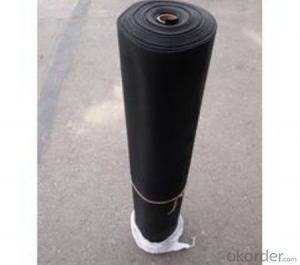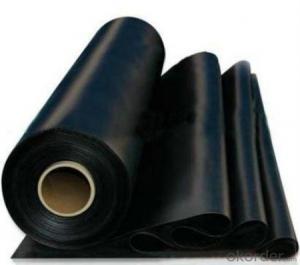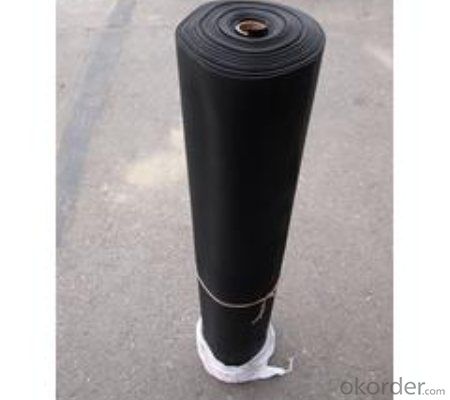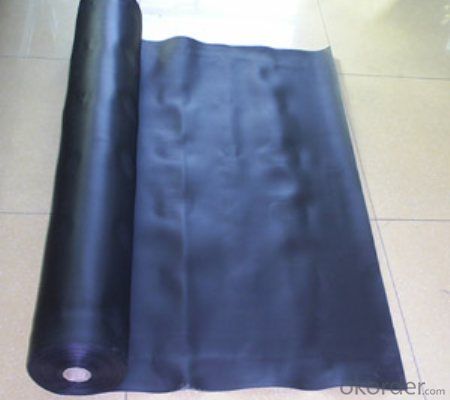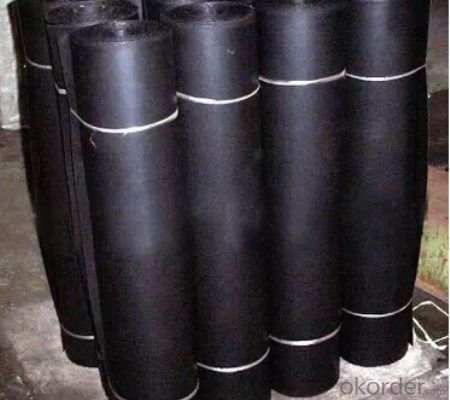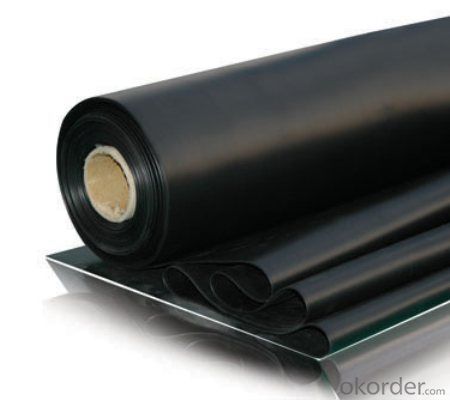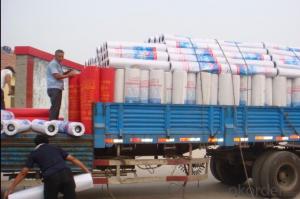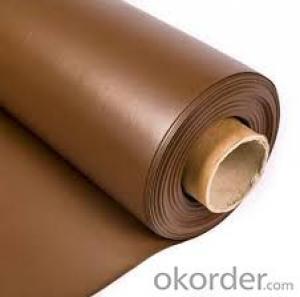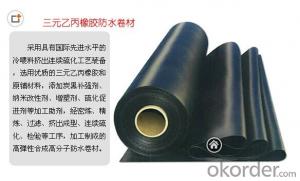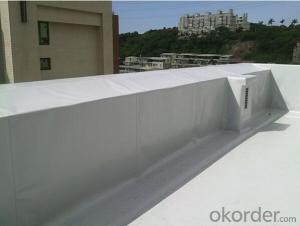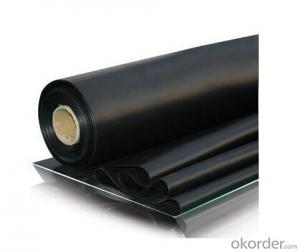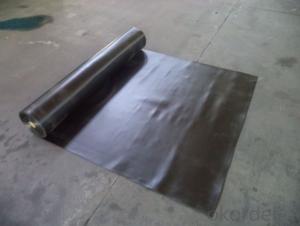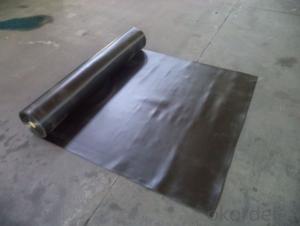Membrane EPDM Vulcanization 1.5mm for Waterproof System
- Loading Port:
- Qingdao
- Payment Terms:
- TT OR LC
- Min Order Qty:
- 12000 m²
- Supply Capability:
- 100000 m²/month
OKorder Service Pledge
OKorder Financial Service
You Might Also Like
EPDM Membrane Vulcanization for Waterproof System
Description Of EPDM Membrane Vulcanization1.5mm:
1. EPDM membrane is made from ternary ethylene-propylene rubber, which is for waterproofing of exposed and non-exposed applications.
2. EPDM membrane production adopts the world-advanced equipment of cold feeding extrusion and continuous vulcanization technology.
Main Features of EPDM Vulcanization1.5mm:
1. Excellent physical and mechanical performance
2. High tearing resistance
3. Good deformation adaptability
Specifications of EPDM Vulcanization1.5mm:
Material | Ternary Ethylene-Propylene rubber |
Size | 1.2m (width)*20m (length) or customized, weldable type 2.05m or 4m width |
Type | Vulcanized |
Applications of EPDM Rubber Vulcanization1.5mm:
1.Roofs, Basement, Toilets
2. Industrial and civil building waterproofing
IMages of EPDM Vulcanization1.5mm:
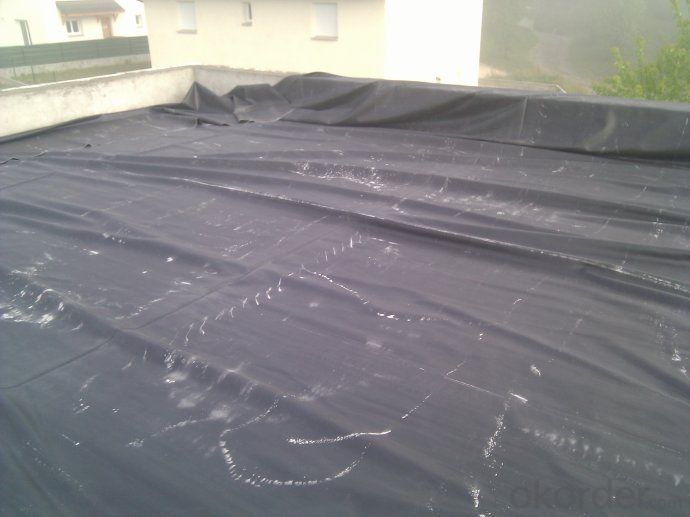
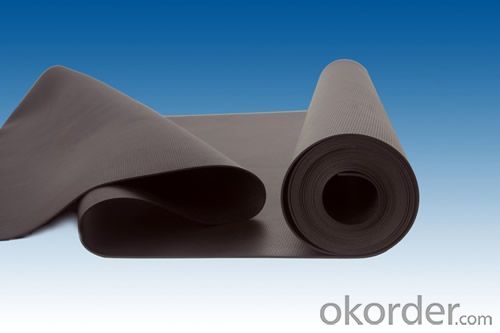
FAQ:
1. What are we supplying?
We are specialized in producing Colorful Asphalt Roof Shingle, SBS/APP modified bitumen waterproof membrane, Self adhesive bitumen waterproof membrane, PVC waterproofing membrane,Single Component Polyurethane Waterproof Coating, and Spray Polyurea Waterproof Coating
.
2. How Many years experience do we have?
We have been exported to more than 15 countries in the past 10 years.
3. How long do we usually reply your request?
We always reply our customer within 12 hours.
- Q: Can a waterproofing membrane be used for a shopping mall?
- Yes, a waterproofing membrane can be used for a shopping mall. Waterproofing membranes are commonly used in commercial buildings, including shopping malls, to prevent water infiltration and protect the building's structure from water damage. They provide an effective barrier against water and are often used in areas such as basements, roofs, and foundations to ensure the building remains dry and protected.
- Q: Can a waterproofing membrane be used in roofs?
- Yes, a waterproofing membrane can be used in roofs. Waterproofing membranes are often used in roofing systems to provide a protective barrier against water infiltration, preventing leaks and water damage.
- Q: Can a waterproofing membrane be used for a residential building?
- A residential building can utilize a waterproofing membrane for its protection. This membrane is a thin material layer applied to the building's exterior walls, foundation, or roof to prevent water from entering the structure. It acts as a barrier against moisture, preventing water damage, mold growth, and enhancing energy efficiency by reducing heat loss. The implementation of a waterproofing membrane in a residential building can be done in multiple areas like basements, bathrooms, balconies, roofs, and exterior walls. It is particularly beneficial in areas prone to water infiltration, such as basements where groundwater seepage may occur or bathrooms where moisture problems can arise from water splashes and steam. Various types of waterproofing membranes are available, including liquid-applied membranes, sheet membranes, and self-adhering membranes. These membranes are designed to be long-lasting, flexible, and resistant to water, ensuring durability and effectiveness in protecting the residential building. By utilizing a waterproofing membrane, homeowners can safeguard their property from water damage, structural issues, and health risks associated with moisture intrusion. It is crucial to seek professional advice to determine the most suitable type of waterproofing membrane for the residential building based on factors like location, climate, and potential sources of water infiltration.
- Q: Can a waterproofing membrane be applied on top of roofing materials?
- Applying a waterproofing membrane on top of roofing materials is a common practice in the construction industry. This is crucial for areas with heavy rainfall or extreme weather conditions, as it provides an extra layer of protection against water infiltration. The waterproofing membrane acts as a barrier, preventing water from seeping through the roof and causing damage to the underlying structure. It is worth noting that depending on the type of membrane used, it can also improve insulation and enhance the energy efficiency of the building. To ensure the effectiveness and longevity of the waterproofing system, it is important to follow proper installation techniques and adhere to the manufacturer's guidelines. It is advisable to consult with a professional roofing contractor or waterproofing specialist to determine the most suitable membrane and installation method for your specific roofing materials and conditions.
- Q: Can a waterproofing membrane be used for a basement floor?
- Yes, a waterproofing membrane can be used for a basement floor.
- Q: Can waterproofing membranes be used on elevator shafts?
- Elevator shafts, particularly in regions with high humidity or underground setups, often face moisture concerns. This is where waterproofing membranes come into play. These membranes, specifically designed to shield against water and moisture, avert any potential damage to the structural components or electrical systems by preventing their infiltration into the elevator shaft. Typically, these membranes are applied to the walls and floors of the shaft, establishing an impermeable seal that maintains a dry interior. Furthermore, in addition to their waterproofing capabilities, these membranes also aid in inhibiting the growth of mold and mildew, ensuring a safe and healthy environment for both elevator passengers and maintenance personnel.
- Q: Are waterproofing membranes suitable for commercial applications?
- Indeed, waterproofing membranes prove to be a fitting choice for commercial applications. Specifically designed to safeguard buildings, structures, and surfaces from water infiltration, moisture damage, and similar issues, waterproofing membranes are frequently employed in diverse commercial scenarios such as roofs, basements, underground parking garages, and exterior walls. Commercial structures face a wide array of weather conditions and water sources, encompassing rainfall, snowfall, and groundwater. Waterproofing membranes serve as a dependable barrier, effectively preventing water penetration and averting costly water-related harm. Furthermore, they serve as a vapor barrier, mitigating moisture accumulation and condensation within the building envelope, which may otherwise lead to mold growth and structural decay. Waterproofing membranes are obtainable in various materials including bitumen, modified bitumen, EPDM, PVC, and TPO. Each material boasts distinct advantages and characteristics, allowing for flexibility in choosing the most appropriate option for specific commercial applications. They can be applied as liquid coatings, sheets, or panels, providing versatility in terms of installation methods to accommodate diverse building designs and requirements. Moreover, waterproofing membranes can be tailored to cater to specific commercial needs such as fire resistance, UV protection, and durability. This renders them highly effective in safeguarding commercial properties that may be subjected to heavy foot traffic, mechanical equipment, or other potential sources of damage. To summarize, waterproofing membranes prove to be an exceptionally suitable solution for commercial applications. They offer reliable protection against water infiltration, moisture damage, and related issues, ensuring the longevity and structural soundness of commercial buildings. Their versatility, customizable options, and ability to withstand various weather conditions make them an outstanding choice for commercial waterproofing requirements.
- Q: Can a waterproofing membrane be used on concrete tanks?
- Yes, a waterproofing membrane can be used on concrete tanks. A waterproofing membrane is designed to provide a barrier against water penetration and can be applied to various surfaces, including concrete. Concrete tanks, such as those used for water storage or containment, can benefit from the use of a waterproofing membrane to prevent water leakage or seepage. The membrane is applied to the concrete surface, creating a protective layer that prevents water from entering or exiting the tank. This can help to maintain the structural integrity of the tank and prevent any potential damage or contamination caused by water leakage. Additionally, waterproofing membranes can also provide protection against other substances, such as chemicals or pollutants, that may be present in the tank. It is important to choose the appropriate type of membrane for the specific requirements of the concrete tank and to follow the manufacturer's instructions for application to ensure effective and long-lasting waterproofing.
- Q: Can a waterproofing membrane be used for plant rooms?
- Yes, a waterproofing membrane can be used for plant rooms. Plant rooms often house machinery and equipment that require protection from water and moisture. Using a waterproofing membrane can help prevent water damage to the plant room and the equipment inside. It creates a protective barrier that keeps water from penetrating the walls, floors, and ceilings of the plant room. This can be especially important in areas where there is a higher risk of water leaks or condensation. Waterproofing membranes are designed to withstand various environmental conditions and can provide long-lasting protection for plant rooms.
- Q: How does a waterproofing membrane handle soil movement and settlement?
- A waterproofing membrane is designed to handle soil movement and settlement in several ways. Firstly, it acts as a barrier between the soil and the structure, preventing water intrusion and reducing the impact of soil movement on the building. One way it deals with soil movement is by providing flexibility and elasticity. This allows the membrane to accommodate minor soil shifts and settlements without cracking or tearing. By flexing along with the movement, it maintains its integrity and continues to provide a waterproof seal. Additionally, a waterproofing membrane is often reinforced with materials such as polyester or fiberglass, which enhance its strength and resistance to soil movement. These reinforcements help distribute the stress caused by soil settlement over a larger area, reducing the risk of damage to the membrane. Another important aspect is the installation of the membrane. It should be properly anchored and secured to the structure, ensuring that it remains in place even when the surrounding soil moves. This prevents the membrane from shifting or pulling away, which could compromise its effectiveness and lead to water infiltration. Furthermore, some waterproofing membranes also have self-healing properties. This means that if the membrane is punctured or damaged due to soil movement, it can automatically seal the breach to prevent water from entering. This self-repairing ability provides an added layer of protection against soil-induced damage. Overall, a properly installed and maintained waterproofing membrane is designed to withstand soil movement and settlement. By being flexible, reinforced, securely anchored, and possibly self-healing, it can effectively handle these challenges and maintain its waterproofing capabilities for an extended period of time.
Send your message to us
Membrane EPDM Vulcanization 1.5mm for Waterproof System
- Loading Port:
- Qingdao
- Payment Terms:
- TT OR LC
- Min Order Qty:
- 12000 m²
- Supply Capability:
- 100000 m²/month
OKorder Service Pledge
OKorder Financial Service
Similar products
Hot products
Hot Searches
Related keywords
